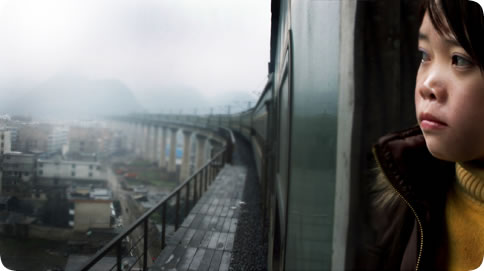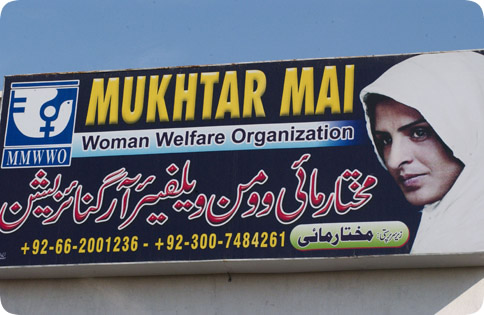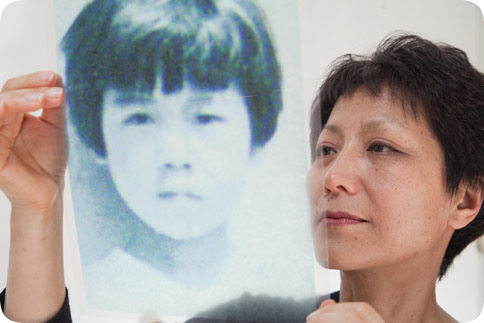AsiaLENS
AEMS Documentary and Independent Film Series
at the Spurlock Museum
AsiaLENS is a series of free public film screenings and lecture / discussion programs -- organized by AEMS in collaboration with the Spurlock Museum -- presenting recent documentary films on issues reflecting contemporary life in Asia.
Local and visiting experts introduce the films and lead audiences in post-screening discussions.
All AsiaLENS screenings are FREE and open to the public every first Tuesday of the month during Fall and Spring semesters at the University of Illinois.
The Spurlock Museum is located at 600 S. Gregory Street, Urbana, IL.
Full schedule for Spring 2011 is listed below.
Information on past screenings:Fall 2008, Spring 2009, Fall 2009, Spring 2010,
Fall 2010
AsiaLENS Spring 2011 Calendar:
Last Train Home
Tuesday, February 8, 2011 - RESCHEDULED from Feb. 1st
7:00 pm
Spurlock Museum
Dishonored
Tuesday, March 1, 2011
7:00 pm
Spurlock Museum
The Sweetest Embrace: Return to Afghanistan
Tuesday, April 5, 2011
7:00 pm
Spurlock Museum
In The Matter of Cha Jung Hee
Tuesday, May 3, 2011
7:00 pm
Spurlock Museum
Last Train Home
Tuesday, February 8, 2011, 7:00 pm (RESCHEDULED from Feb. 1st)
Spurlock Museum, Knight Auditorium
600 S. Gregory Street, Urbana, IL
Last Train Home
by
Lixin Fan, 2009, 85 minutes.
In Mandarin and Sichuan dialect with English subtitles.
Discussion led by Nancy Jervis (Program Coordinator, Asian Educational Media Service, UI).

Description:
Every spring, China’s cities are plunged into chaos as 130 million migrant workers journey to their home villages for the New Year’s holiday. This mass exodus is the world’s largest human migration—an epic spectacle that reveals a country tragically caught between its rural past and industrial future. Working over several years in classic verité style Chinese-Canadian filmmaker Lixin Fan (with the producers of the award-winning hit documentary Up the Yangtze) travels with one couple who have embarked on this annual trek for almost two decades. Like so many of China’s rural poor, Zhang Changhua and Chen Suqin left behind their two infant children for grueling factory jobs. Their daughter Qin—now a restless and rebellious teenager—both bitterly resents their absence and longs for her own freedom away from school, much to the utter devastation of her parents. Emotionally engaging and starkly beautiful, Last Train Home’s intimate observation of one fractured family sheds light on the human cost of China’s ascendance as an economic superpower.
Resources:
Official website:
Zeitgeist Films
Contains a synopsis of the film, filmmaker bio, trailer, reviews, and purchasing information.
Reviews:
New York Times
NPR
Dishonored
Tuesday, March 1, 2011, 7:00 pm
Spurlock Museum, Knight Auditorium
600 S. Gregory Street, Urbana, IL
Dishonored, by
Sigrun Norderval & Gard A. Andreassen, 2007, 52 minutes.
Discussion led by Asef Bayat, PhD (Professor, Department of Sociology and Middle East Studies, UI).

Description:
In June 2002, a dispute involving a question of honor between the Mai and Mastois clans in rural Pakistan was judged by a local tribal council. When Mukhtar Mai pleaded on her family's behalf, the local imam consented to her punishment as honor-revenge, and she was brutally gang-raped by four men from the Mastois clan.
Although local tradition presumed that Mukhtar would commit suicide because she had been dishonored, this strong-willed peasant woman reported the rape to the local police, and when they refused to do anything, a local journalist published her story, which soon erupted in a national controversy over the oppression of women under Islamic law.
DISHONORED documents the remarkable story of Mukhtar Mai, whose demand for justice received media coverage worldwide, and which over the next few years led to a dramatic series of legal proceedings through Pakistan's lower court system, with successive controversial decisions being appealed, to a final ruling by the nation's Supreme Court, which led to changes in the legal system.
Over a period of four years, despite death threats, Mukhtar Mai persisted in her search for justice, and was also instrumental in establishing a Crisis Relief Centre for abused women and a new school where girls as well as boys can be educated, had her autobiography published in 21 languages in 45 different countries, and traveled on behalf of women's rights throughout Europe and at the UN in New York
DISHONORED features interviews with Mukhtar Mai as well as a variety of human rights and women's rights activists, lawyers, government officials, politicians and journalists, all of which serve to illuminate the widespread abuse of women throughout the region.
“Astounding... takes the viewer through the legal system and cultural system that suppresses women’s rights... Excellent sound, photography and editing... A story of conviction. A story of changing reality. A must see.” —Educational Media Reviews Online
Resources:
Official website: Icarus Films
Contains a synopsis of the film and purchasing information.
Reviews:
Educational Media Reviews
The Sweetest Embrace: Return to Afghanistan
Tuesday, April 5, 2011, 7:00 pm
Spurlock Museum, Knight Auditorium
600 S. Gregory Street, Urbana, IL
The Sweetest Embrace: Return to Afghanistan, by
Najeeb Mirza, 2008, 74 minutes.
Discussion led by Alisha Kirchoff (Associate Director, Russian, East European, Eurasian Center, UI).

Description:
Soorgul was only 10 when he said goodbye to his family in the mountains of northeastern Afghanistan. Crossing into Soviet Tajikistan over the turbulent Amu Darya River, he clutched the sides of a wooden gondola as it slowly it made its way to the other side.
He was supposed to spend a year studying in Tajikistan, but it would take 16 years and a journey to Canada before he could return to his village.
Soorgul was one of many Afghan children sent to Tajikistan during the Soviet occupation of their country. When the Soviet Union collapsed, civil war broke out on both sides of the border and the children were left stranded. He and a few of his schoolmates were able to leave Tajikistan only after many years, when Canada accepted them as refugees.
In The Sweetest Embrace Soorgul and Amir—two of these forgotten boys of Afghanistan—return to their country in search of their families.
We meet Soorgul and Amir in Kabul and join them as they travel north towards the villages where they last saw their families. After an American military accident leads to riots, it becomes too dangerous to carry on in NGO vehicles. They switch to local vans and finally, when rock-strewn roads become completely impassable, finish their journey on foot through some of Afghanistan’s highest mountains.
But when their paths diverge, their futures become filled with unexpected and unpredictable turns as they seek to find resolution in their lives.
The Sweetest Embrace tells an intimate story set against one of the world's most harsh and yet beautiful landscapes, in a land where life has been shaped by war and hardship but where spirit remains resilient.
Resources:
Offical Website: National Film Board of Canada
Contains a synopsis of the film, biographical information on the production team, interview with the director and producer, film clips and purchasing information.
In The Matter of Cha Jung Hee
Tuesday, May 3, 2011, 7:00 pm
Spurlock Museum, Knight Auditorium
600 S. Gregory Street, Urbana, IL
In The Matter of Cha Jung Hee by Deann Borshay Liem, 2010, 62 minutes.
Discussion led by Nancy Abelmann (Harry E. Preble Professor, Anthropology, UI)

Description:
Her passport said she was Cha Jung Hee. She knew she was not. So began a 40-year deception for a Korean adoptee who came to the US in 1966. Told to keep her true identity a secret from her new American family, this eight-year-old girl quickly forgot she was ever anyone else. But why had her identity been switched? And who was the real Cha Jung Hee? IN THE MATTER OF CHA JUNG HEE is the search to find the answers. It follows acclaimed filmmaker Deann Borshay Liem as she returns to her native Korea to find her “double,” the mysterious girl whose place she took in America. Traversing the landscapes of memory, amnesia and identity, while also uncovering layers of deception in her adoption, this moving and provocative film probes the ethics of international adoptions and reveals the cost of living a lie. Part mystery, part personal odyssey, it raises fundamental questions about who we are…and who we could be but for the hands of fate.
Resources:
Official Website: Mu Films
Contains a synopsis of the film, filmmaker's statement, biographical information on the production team, film trailer, adaptee resources, and purchasing information.
Filmmaker Interview:
New America Media
Last Updated January 11, 2011.

